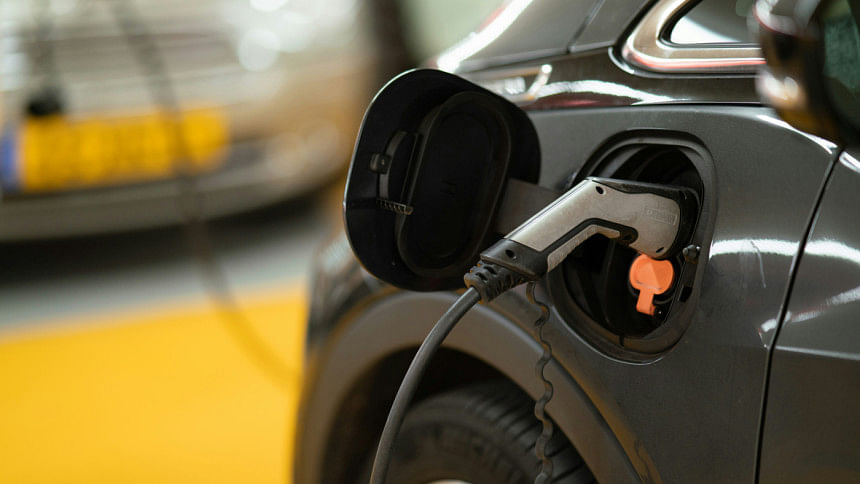Why is EV infrastructure investment crucial to Bangladesh’s green future?

Bangladesh has slowly been steering towards a sustainable and energy-efficient future. Chief Adviser Professor Muhammad Yunus has already called world leaders to build a 'World of Three Zeros', meaning zero poverty, zero unemployment, and zero net carbon emissions. He also added that people's lifestyles should be based on zero-carbon; thus, there is no fossil fuel but only renewable energy. To accelerate the goal towards zero net carbon emissions, we must realise the full potential of the EV (Electric Vehicle) industry, which can promise far-reaching benefits from decreasing dependency on fossil fuels, reducing greenhouse gas emissions, and enhancing public health.
However, without an adequate, affordable, accessible, and reliable charging ecosystem, EV adoption will stay confined to niche markets. According to the Bangladesh Energy Regulatory Commission (BERC), only 14 EV charging stations are across Bangladesh. Such a low number of charging stations is grossly inadequate to charge the influx of EVs in the coming years. In urban cities like Dhaka and Chattogram, where air pollution and traffic congestion are significant issues, an immediate rollout of charging stations can serve both public health and environmental goals.
In fact, the problem is not just having an inadequate number of charging stations nationwide, but also their strategic placement and interoperability. Charging points must be located at high-traffic urban centres, commercial districts, highways, residential areas, hotels, and tourist destinations. Thus, multiple companies are collaborating to establish EV charging stations in precisely important locations nationwide. Companies like BYD, Ekhon Charge, and Crack Platoon are actively setting up EV charging stations nationwide, targeting premium locations such as hotels, tourist spots, highways, and commercial areas to support EV users. Even though these efforts are commendable, they still need to be scaled rapidly and supported by a broad national infrastructure plan.
A significant adjuvant for progress lies in collaboration among all stakeholders – EV manufacturers, power companies, technology providers, and government agencies. Through these partnerships, EV sectors can standardise charging technologies, lower infrastructure costs through shared investments, and ensure seamless customer experiences. A high level of coordination would boost customer confidence, which might play a vital role in accelerating the EV uptake.
Moreover, PPPs (public-private partnerships) can also play a critical role in the ecosystem because private industries would bring innovation, agility, and capital investment. In contrast, the government side will enable policy frameworks, land use rights, and incentives. A noteworthy example: in 2023, the Nepal Electricity Authority (NEA) installed 51 fast-charging stations across the nation, including urban centres, transportation hubs, and major highways. NEA has also supported initiatives from the private sector through grid line extensions and transformer installations of up to 200kVA capacity.
In Bangladesh, we can do something similar. The Nepal government took such an initiative due to the Paris Agreement. Bangladesh is also part of the Paris Agreement, under which they have committed to decrease carbon emissions by 21.85% by 2030. Encouraging EV adoption directly will support Sustainable Development Goals (SDGs), such as SDG 13 (Climate Action), SDG 7 (Affordable and Clean Energy), and SDG 11 (Sustainable Cities and Communities).
The more we can decrease our reliance on imported fossil fuels, the closer we move to high energy usage, which will be a strategic priority for Bangladesh. In FY 2022-23, Bangladesh spent over $7 billion on fuel imports and procured 1.4 million tons of fuel from seven countries in the first half of 2025, costing $9.6 million. By investing in robust EV infrastructure, we are encouraging local EV manufacturing, curbing outflow, and building a future-ready industrial base that is aligned with global sustainability goals.
Moreover, building a robust EV infrastructure along with charging stations requires stronger power capacity; thus, this creates additional opportunities to invest more in grid modernisation, renewable energy integration, and smart energy management. A combination of such investments will support both the growth of the EV industry and improve the resilience of the power sector. Furthermore, the development of the EV sector will have a substantial economic impact as it will create both direct and indirect employment in the installation, operations, manufacturing, and maintenance of charging stations. It will also vitalise growth in related industries like software development, energy services, and battery technology. According to Goldman Sachs Research, EVs will make up about half of new car sales globally by 2035.
Besides being economically beneficial, a cleaner transport sector will have direct public health implications. Air pollution, which is primarily caused by petrol-powered vehicles and diesel, is one of the leading causes of respiratory illness in Bangladesh. Increasing dependency on EVs instead of internal combustion engine vehicles can significantly improve air quality, lower the societal burden of diseases, and decrease healthcare costs.
So, now is the time to take bold and coordinated actions. We are urging the government to lead the development of a national EV infrastructure roadmap backed by fiscal incentives and innovative policy instruments. It also includes access to low-cost land for station construction, favourable financing for investors, and import duty relief on charging equipment. Simultaneously, we call on all the EV manufacturers and service providers to combine their knowledge, resources, and networks to create a unified charging ecosystem. Together, we can build a transportation sector that is efficient, inclusive, clean, and economically vibrant.
The author is the Head of Business Development at BYD Bangladesh.

 For all latest news, follow The Daily Star's Google News channel.
For all latest news, follow The Daily Star's Google News channel. 



Comments